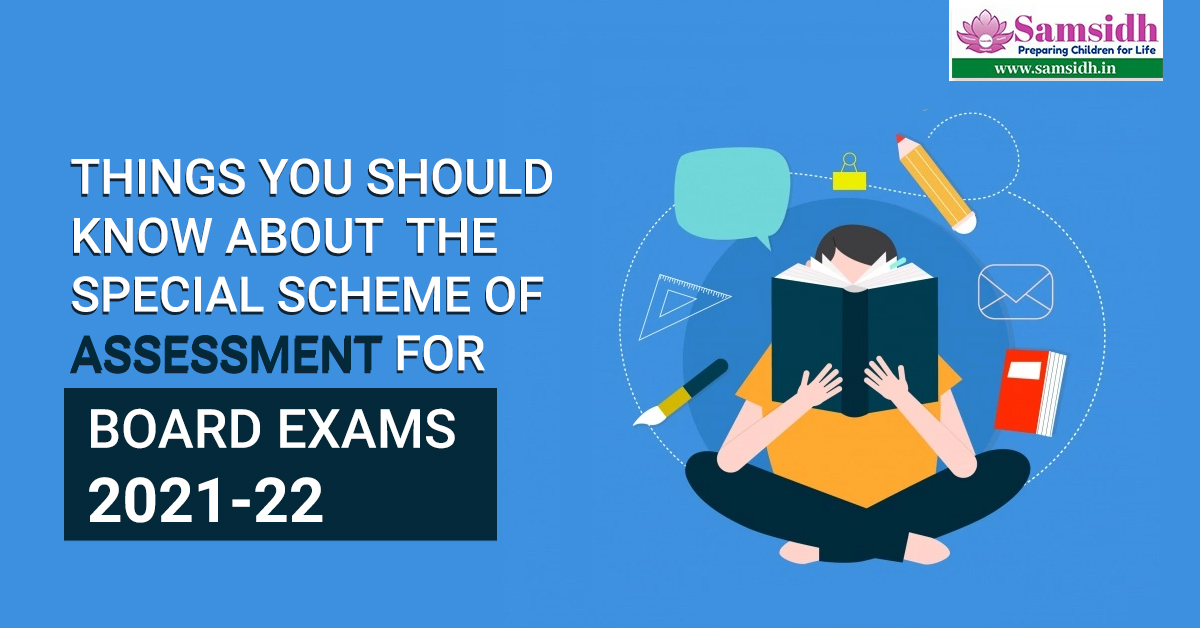True to its constant endeavour to shift from the trend of rote learning to Competency-based Education (CBE) and by way of implementing the National Education Policy 2020, CBSE had made concrete changes in the board examination assessment scheme for the academic year 2021 – 22. Assessments are more formative and promote critical thinking, tipping the scale towards conceptual clarity of topics rather than rote memorization.
CBSE has truncated the syllabus considerably, keeping in view the problems of virtual education delivery owing to the closure of physical schools during the COVID 19 pandemic. The board has decided to further split the session into two equal terms with a 50% load of the syllabus on each. Every term will conclude with a board-organized and a term-end examination. A continuous evaluation system is implemented to test the students’ understanding of the topics including, practical and project work and internal assessments.
Welcoming this much-needed change in the way students learn and grow, academicians at Samsidh list the finer points of the special scheme of assessment for board exams to be held in the current session.
Composition of Year-End/ Board Examination
Till the AY 2020 – 21, the examination questions for class 10th were composed of 20% objective-type, 20% case or source-based integrated questions, and the remaining 60% would be a combination of short and long answer type questions. From the current academic year onwards, this pattern will change to at least 30% of competency-based questions, 20% objective questions, and 50% short or long answer type questions.
Similarly, the class 12th examinees will write 20% each of application-based and objective questions and the rest, short/ long answer questions, instead of the existing breakup of 20% objective, 10% case or source-based questions, and 70% of long/short questions.
With this composition of questions, CBSE aims to encourage students to hone their creative and analytic skills and focus more on the practical application of their concepts.
Scheme of Continuous Evaluation
Students of classes 9th till 12th, irrespective of the terms, will have to complete a specific schedule of continuous assessments throughout the academic year.
Evaluation of the students of class 9th and 10th will be based on 3-periodic tests, enrichment activities, practical work and project work. Class 11th and 12th students will be assessed on the basis of topic or unit-end tests, exploratory activities, and practical or projects.
To add credibility to these assessments, schools upload evidence of all the tests and project work on the CBSE IT platform as per the guidelines.
Conduction of term-end examinations
Examinations at the end of terms I and II will be organized by CBSE. The question papers will be set by the board and exams supervised by CBSE-appointed supervisors/ observers.
The term I, to be held in a flexible window between November-December 2021, will consist of case-based/ assertion-reasoning type problems. Students will mark their answers on OMR sheets which will then be scanned and uploaded on the CBSE portal by the school.
In term II, slated to be held in March-April 2022, students will write a 2-hour exam comprising case/ situation-based, open-ended short and long answer type questions. If the situation doesn’t permit conducting such a descriptive examination, the board has provision for a 90-minute MCQ-type test.
Marks obtained in the two term-end examinations will add up to the final aggregate score of the session, along with the internal assessment scores achieved throughout the year.
CBSE has created provisions to counter all possible scenarios of organizing and conducting these term-end examinations in the purview of the pandemic. With the first term-end examination of the session drawing close, Samsidh Group of Schools is ready to successfully execute the new assessment scheme in coordination with the board.

